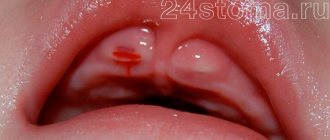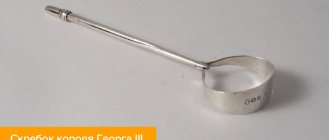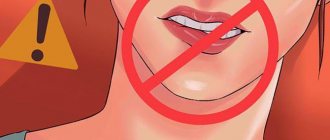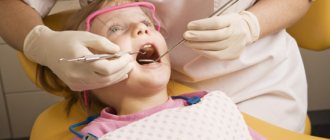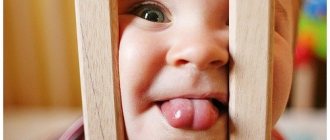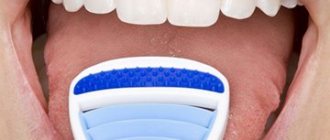The cause of many oral diseases is most often the development of harmful bacteria. However, many people are aware of the unpleasant sensations on the tongue as a result of mechanical damage to the teeth. How to properly provide first aid to someone who has bitten their tongue at home, as well as what treatment is required for this injury will be discussed in the article.
First rule: inspect the extent of the damage
Children are very active and restless, so the situation when a child bites his tongue is quite common. For example, with the smallest children, trouble could occur even in the process of learning to walk, when the kids take their first steps. With older children, the reason may be active play, sports, talking while laughing and eating, or pampering. But whatever the reason, children of any preschool and primary school age react quite sharply to such trauma; they begin to cry and be capricious. For any caring parent, this behavior causes panic. However, on the contrary, you need to calm down and try to distract the child in order to conduct an oral examination.
“The reason that a child might bite his tongue is sometimes not only the consequences of everyday life. The problem could also arise due to malocclusion or dental problems (for example, abnormal wear of teeth). If the teeth are positioned incorrectly in the oral cavity (in particular, with a distal and mesial bite), then they can often provoke injuries to the mucous membrane, injure the lips and the inside of the cheeks, and the tongue. Therefore, be sure to show your child to the orthodontist at a very early age, especially if this situation is repeated more than once,” says E.A. Kuznetsov, orthodontist.
Small children begin to cry and be capricious.
When the first tears have passed, bring the baby to a window or light source, ask him to open his mouth and carefully examine the mucous membrane: the injury may be located on the tip, back of the tongue, or on the outer, inner or lateral surface. It is necessary to assess the size and depth of the damage, the presence of swelling and hematomas, in order to understand whether the situation requires an emergency visit to the doctor or at first the baby just needs to be given first aid and observed.
Child chews tongue
Often, tongue injury occurs due to the baby’s tongue chewing habit. Most often, the problem occurs when teeth grow - the baby refuses teethers, but actively sucks his finger or tongue. But a bad habit may have other reasons.
Why do children chew their tongue?
- Hunger . When it's feeding time, babies often start chewing their tongue instead of eating. When the child grows up a little and learns to voice his desires, the problem will disappear on its own.
- Weaning off the pacifier . If you take away your child's favorite pacifier, but do not allow him to suck his finger or put foreign objects into his mouth, the baby begins to suck and chew the tongue.
- Thoughtfulness . Often children, if they are very passionate about something or are thinking about something, stick out or chew their tongue. The problem also arises if the baby is bored and suffers from a lack of parental attention.
Most often, the habit of chewing tongue in children goes away on its own with age.
But if you notice that your baby obsessively chews his tongue all the time, contact a neurologist to identify nervous disorders in time.
Second rule: stop the bleeding
The tongue is an organ that is penetrated by blood vessels and nerve endings. Therefore, after a child bites his tongue hard, it will bleed. To stop the bleeding, you need to compress the blood vessels or promote their narrowing. This can be achieved using cold. Therefore, the first thing you should do is to invite your child to rinse his mouth with cool water. You can also take a sterile bandage or cotton wool and press firmly onto the wound for 5-10 minutes. This will also help block the access of saliva to the damaged mucosa. But if the bleeding cannot be stopped within half an hour, then you need to consult a doctor.
A cotton swab or bandage will help prevent bleeding
Some sources contain information that you can wrap ice in a napkin and apply it to the damaged surface of the tongue. We do not recommend doing this. Such actions in relation to young children are fraught with the development of undesirable consequences. Few children will be able to hold ice in their mouth normally and motionlessly, and the effect of ice on children’s delicate mucous membranes can provoke the development of sore throat and colds.
Treatment
Sometimes biting your tongue can cause a lump. In this case, you need to show her to a doctor. Well, for first aid you need to use one of the means that were previously described.
When injured, the tongue can become quite painful. If the adult continues to suffer, then this pain will cause a lot of problems for the child and his parents. If the baby experiences pain that does not go away, or a wound or ulcer has appeared, then you need to show him to the doctor as soon as possible.
You can apply ice to relieve some pain and reduce swelling. Well, if it is prepared from a decoction or solution of chamomile, sage, calendula. Ice is placed in a bag, wrapped in a clean cloth and applied as a compress to the injury site. For it to help, you need to hold the ice for 10-15 minutes.
If the injury is deep, take your child to the doctor.
If you have aloe at home that is older than two years, you can use its juice. It quickly heals wounds and disinfects them. Just cut off the leaf, wash it and apply the cut to the wound. Aloe juice is used in compresses.
Sores in the mouth can be treated well with regular baking soda or salt. They can be mixed and prepared as a solution, or they can be diluted in water separately (a teaspoon of the product per glass of water). You can make a compress with this solution, or you can rinse your mouth.
In case of severe injuries, it is important to support the immune system. It is important that the body quickly regains its strength. It must resist inflammation and general infection. For this purpose, vitamins and immunomodulators are prescribed. The menu should include a lot of fiber products. It is important to saturate the body with microelements.
A doctor's help is needed in the following cases:
- Where the wound formed, a strong swelling and hematoma appeared.
- It took half an hour to stop the bleeding.
- Part of the tongue was completely bitten off.
- The tissues are bitten through.
- The wound is long, deep, and has uneven edges that cannot be aligned.
- The wound is larger than 5 mm and bleeds quite heavily.
- Over time, the pain does not subside and swelling appears.
Traditional medicine will speed up healing.
Often in such cases the question arises: “Which doctor is best to contact?” If the wound is fresh, you need to go to a traumatologist. But a pediatrician will help you cope with prolonged wounds or ulcers. If the injury is serious, a surgeon may be needed.
Third rule: disinfect the wound
This must be done in any case, but it is especially important when the child bites his tongue hard while chewing food. In this situation, first of all, you need to remove all remnants and particles of food from your mouth, because... their presence and entry into the wound can provoke the development of an inflammatory process. Therefore, the first thing we do is rinse our mouth with water, the second thing is to brush our teeth with a toothbrush and toothpaste, and the third thing is to disinfect the wound.
What is suitable for this? For the little ones you can use Miramistin, for older children and those who are already able to hold more serious medications in their mouths and not swallow them - Chlorhexidine. You can also prepare a decoction of chamomile or sage for rinsing. Do not forget that before disinfection procedures it is important to thoroughly wash your and your child’s hands - you should not put dirty hands in your mouth. Also, the mechanical impact on the mucous membrane, if you use gels, should be minimal; you should not put pressure on the wound.
Under no circumstances should you treat the sensitive mucous membrane in your child’s mouth with hydrogen peroxide, much less iodine or brilliant green, potassium permanganate. Such actions can only aggravate the situation, causing a soft tissue burn. Also, avoid using antibiotics without consulting a specialist.
Be prepared for the fact that during treatment with anti-inflammatory drugs, the baby may complain of increased pain and burning - this is normal, because the tongue is a very sensitive organ.
What means are used?
Tongue bite is a common injury. Liquid products are used. Rinsing relieves inflammation, pain, and accelerates wound healing. You can use the following tools :
- Hydrogen peroxide . This is an excellent antiseptic with a mild effect. It will inhibit the development of bacteria, clean the wound, and speed up healing. A hydrogen peroxide solution is used for rinsing. 3% peroxide is diluted in water. Proportion 1:1. The number of rinses is twice a day, not more often. The solution should not be swallowed, so it is better not to use it if the child is injured. You can apply a tampon soaked in peroxide to the area of inflammation.
- Salt solution . Salt perfectly disinfects and promotes wound healing. You need to prepare a low concentration saline solution. Just add a teaspoon of salt to a glass of water. To prevent the salt from settling, it must be stirred well. You need to rinse your mouth with this solution three times a day.
- Antihistamines and antacids . They work in the same way as salt or peroxide. Additionally, if used together, acidity in the mouth can be controlled. Antacids include Gaviscon or Gelusil. Antihistamines – Diphenhydramine. It is necessary to use drugs from both groups simultaneously, in equal proportions. You can also make compresses with them. It is also possible to use them separately.
- Rinse aids. Mouthwashes contain substances for healing wounds in the mouth. Therefore, they can also be used in case of injury. The instructions will tell you how to rinse. They can be used every time after meals.
Hydrogen peroxide can be used to treat the wound.
Rule four: help your baby cope with pain
What to do if a child bites his tongue? Make sure that your baby has a minimum of discomfort after this unpleasant moment, because his tongue is not only damaged, but also very painful. Apply any gel to the mucous membrane that is suitable for sore gums during difficult teething. For example, “Kamistad Baby”, “Kalgel”. You can also give your child Nurofen or Panadol, Viburkol - these medications will comprehensively help relieve anxiety, prevent the appearance of fever, and reduce pain.
Painkillers will help your child survive the problem.
“My daughter recently lost all her eye teeth, and against this backdrop, a real nightmare began at home. She bit her entire tongue, sores and grooves appeared on it, the whole tongue was red. We went to the pediatrician, and she told me to use only Stomatidin for prevention and observe, supposedly, my daughter will get used to the new sensations from the grown teeth and it will pass. And I’m afraid that it will become like a bad habit!”
Sofia R., from correspondence on komarovskiy.net
But products such as Lidocaine or eye drops (some sometimes use them for other purposes and even recommend them as a topical anesthetic), which are in the home medicine cabinet, should not be used. These adult medications have many contraindications, have side effects and should not be swallowed, and rarely can any child not swallow saliva and sit motionless with their mouth open until the medicine takes effect.
Rule 5: In case of emergency, consult a doctor immediately.
Let us indicate which situations can be considered emergency and do not require a postponed visit to the doctor:
- a lot of blood
- bleeding cannot be stopped on its own for a long time,
- the wound is very large and deep, more than five millimeters in diameter,
- the wound began to fester,
- It is discovered that the child has bitten through the tongue or even bit off the tip: in this case, there should not even be any questions about what to do. Of course, go to the doctor immediately,
- the baby is in pain, but the pain is not relieved by analgesics and continues to increase,
- the tongue itself is swollen, a thickening has appeared on it,
- the wound does not heal for more than four days: a good sign if a gray coating appears on it - this is a protective fibrin film produced by our immune system,
- the child’s lips turned blue, he developed convulsive tremors: this may indicate the presence of painful shock,
- Against the background of the injury, the child’s condition worsened, the body temperature rose, and general malaise appeared: a viral or bacterial infection may have occurred. Often, against the background of a bitten tongue, a child may develop stomatitis.
In emergency cases, consult a doctor immediately.
In such cases, the baby may require the help of a pediatrician, traumatologist or maxillofacial surgeon, dentist, and even surgical intervention, such as suturing. If you do not contact a specialist or delay this, the situation may be fraught with consequences: the appearance of serious hematomas, infection of the lingual muscles, and the occurrence of serious speech defects in the future.
Rule six: help the wound heal faster
Experts say that the human mucosa regenerates very quickly. But the whole problem is that the tongue is actively involved in the process of chewing food and is located in the mouth, where there is an excellent environment for the growth of bacteria. To ensure that the wound caused by biting your tongue heals faster and does not become an object for attack by bacterial colonies that live in the mouth and provoke an inflammatory process, try to follow several rules during the first 7-14 days:
- for the first few hours after the injury, do not give the baby anything to drink or eat,
- Adjust the child’s diet: there should be no irritating factors in the diet. Food – warm (not cold or hot), soft, pureed, mushy or liquid. Any foods that need to be chewed are excluded. Vitamin products should be present in the diet. To restore the epithelium of the mucous membrane, those containing vitamin C, B,
- Monitor your baby’s oral hygiene: after each meal, rinse the mouth with water or herbal decoctions (chamomile, sage, St. John’s wort), and antiseptics. You should also thoroughly clean your teeth and gums twice a day with a brush and suitable paste; the tongue area should be avoided during the rehabilitation period.
Rinsing the mouth after every meal will help speed up healing.
If the situation occurred in the summer and your baby is healthy, then some parents, from their own experience, advise giving him ice cream, which will help relieve discomfort and pain. You can also listen to this advice if you consider it rational.
Rule seven: pay attention to the complex of concomitant diseases
As experts say, injuries to the tongue, as well as to the inside of the cheeks and lips, do not always occur in a child due to activity and restlessness. Sometimes they indicate the presence of some undetected diseases, especially if the situation repeats itself again and again. For example, the cause may be the presence of bite pathologies, abnormal attachment of the frenulum of the tongue, paresthesia (decreased sensitivity of nerve receptors). In the first two cases, an orthodontist, dentist, or pediatric surgeon will help solve the problem. If you have paresthesia, you will need to visit a neurologist, endocrinologist, and other specialists.
Notice
: Undefined variable: post_id in
/home/c/ch75405/public_html/wp-content/themes/UltraSmile/single-item.php
on line
45 Notice
: Undefined variable: full in
/home/c/ch75405/public_html/wp-content /themes/UltraSmile/single-item.php
on line
46
Rate this article:
( 3 ratings, average: 3.67 out of 5)
language
Consulting specialist
Kuznetsov Egor Andreevich
Doctor rating: 9 out of 10 (3) Specialization: Orthodontist Experience: 14 years
Signs
The main symptom is the child complains of pain. Examine your tongue carefully in good lighting. The fresh wound bleeds and is clearly visible.
A tongue injury may be indicated by the baby’s complaints about discomfort when eating hot, sour foods. If you carefully examine the tongue, you can see swelling and hematoma.
Comments
I read your article and a question came up a little off topic, but close. I recently had my teeth treated by a dentist, had crowns put in, and after that I started constantly biting my tongue. Why is this happening?
Alla (03/06/2019 at 11:40) Reply to comment
- Dear Alla! If the doctor did his job poorly, for example, poorly fitted and installed the crowns, or they were made without taking into account your anatomical features and the state of your bite, then yes, you can injure your mucous membranes and tongue because of this. If this situation occurs on an ongoing basis, then be sure to see the dentist and orthopedist who installed the crowns. Doctors will assess the situation and offer options for solving the problem, but if the crowns are already fixed with permanent cement and it is because of them that troubles occur, then they will have to be completely removed and new ones made.
Editorial staff of the portal UltraSmile.ru (03/09/2019 at 08:47) Reply to comment



